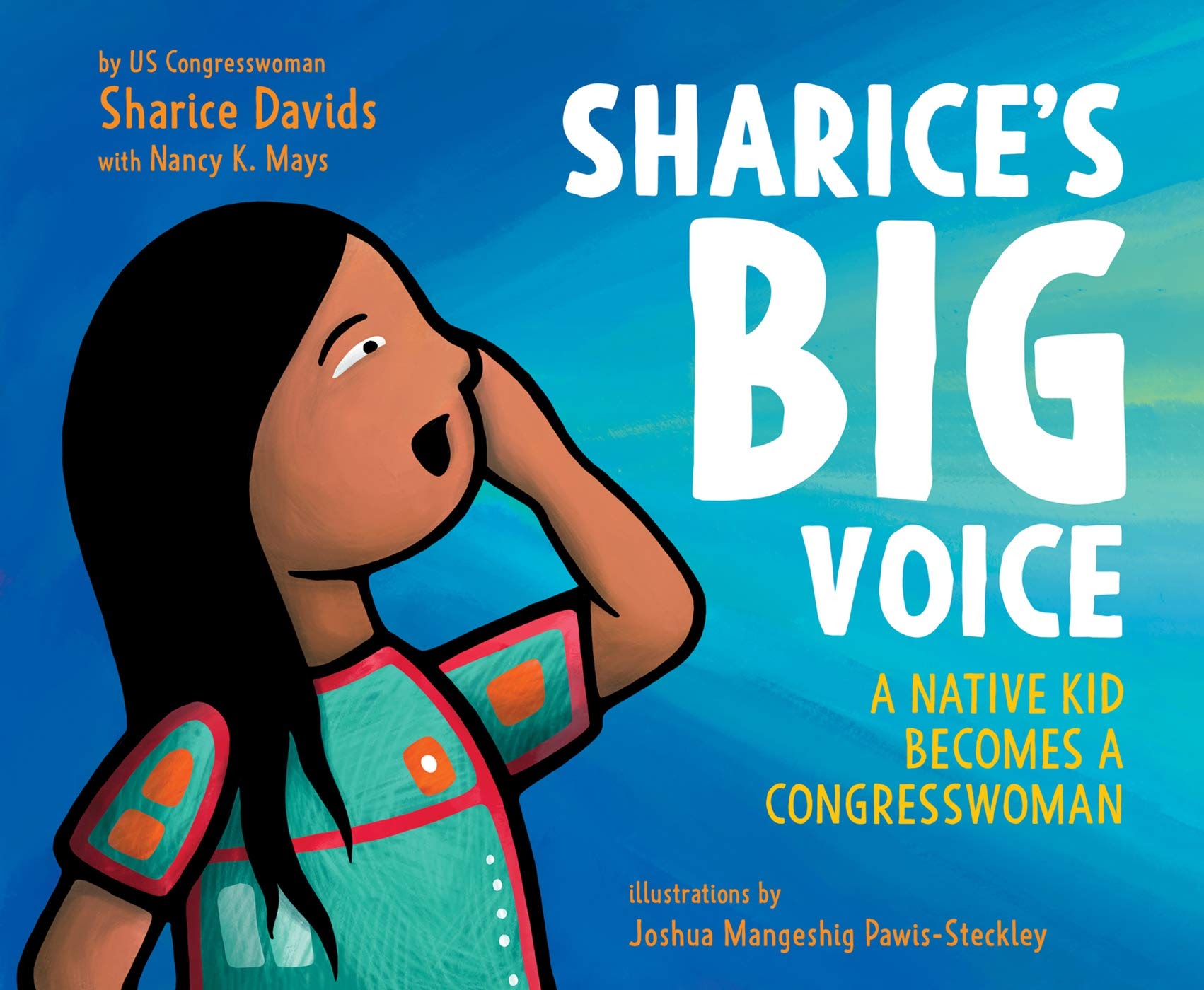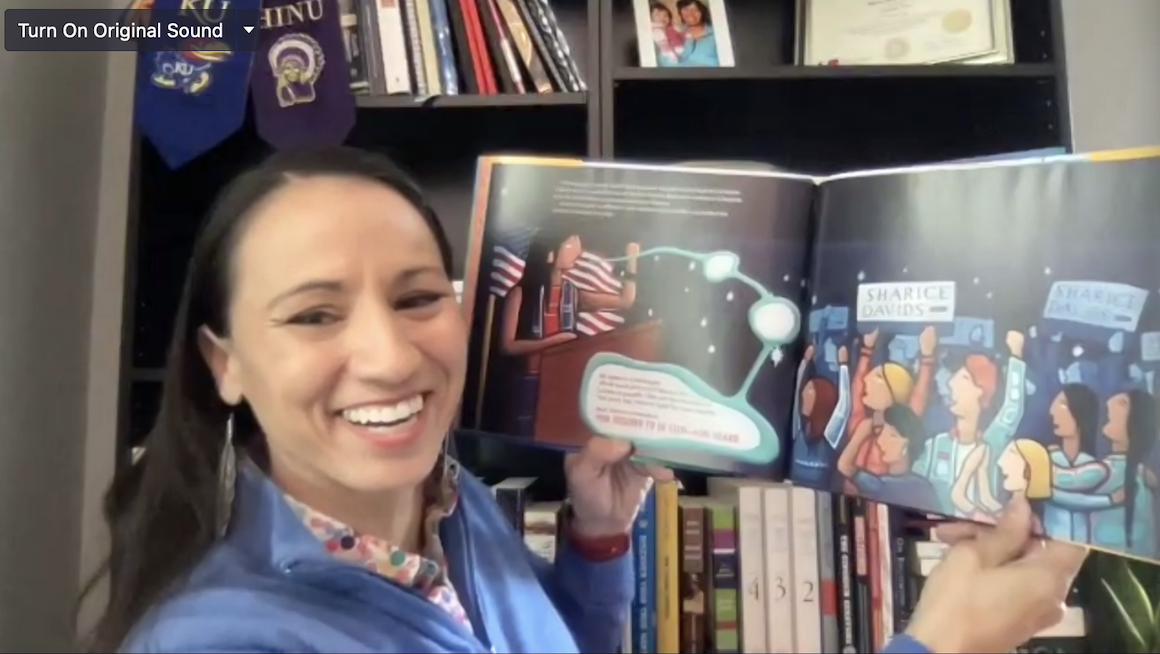
- Details
- By Jenna Kunze
When Rep. Sharice Davids (D-Kansas) joined Native News Online for a video call this week from her home office in Roeland Park, Kan., she was backdropped by a bookshelf containing important memorabilia: a photograph of herself as a child in her mother’s arms; side-by-side flags for two of her alma maters, Kansas University and Haskell Indian Nations University; her law school degree certificate earned from Cornell Law School; and her first book, which was released June 1, "Sharice’s Big Voice."
The children’s book, co-authored by Davids and Kansas-based writer Nancy Mays, tells the story of Davids’s journey from a “loud” Native kid growing up in Kansas frequently reprimanded for speaking out of turn, to her rise to Congress. In 2018, the former mixed-martial artist made history when she became one of the first two Native American women elected to Congress, and the first openly LGBTQ2S+ person to represent Kansas in Washington.
Want more Native News? Get the free daily newsletter today.
Davids, 41, said she was inspired to write the book to show children that there are many different paths you can take to reach your goals, or finding your voice. Additionally, she said, only one percent of children’s books contain Native representation.
Davids, a member of the Ho-Chunk Nation of Wisconsin, has drawn inspiration from her tribe’s name, meaning “the people of the big voice.”
“When I was a kid and I looked at adults, it always seemed like adults... they've got it all figured out,” Davids said. “You see successful people and you think, that person had it all figured out the whole time, like they never got bad grades, they never got in trouble in school. And I think we all know that's not true.”
 Rep. Sharice Davids reads from her children's book "Sharice's Big Voice," released June 1.
Rep. Sharice Davids reads from her children's book "Sharice's Big Voice," released June 1.
As a kid, Davids said she struggled with identity, and often got in trouble in school for talking too much.
It wasn’t until later—after pursuing her law degree, working in economic and community development on Native American reservations, earning a White House Fellowship under President Barack Obama, and eventually becoming a member of Congress— that the congresswoman said she learned to see the positives in her loud voice.
“Something that might have been considered a flaw by some people, has actually turned out to be a pretty big strength that I have,” she said.
As a young legislator, Davids used her voice to advocate for Missing and Murdered Indigenous Women and People, land-into-trust issues, climate change concerns, and infrastructure needs throughout Indian Country.
“Just being able to share some of the stories... that... Native communities have shared with me, has made a pretty big difference,” she said. “Especially in a body like Congress, if I can change like five members of Congress’ minds about something that could be the difference between passing or not passing a bill.”
The book—which also includes information about the Ho-Chunk Nation by former President John Greendeer—was named Here Wee Read’s 2021 List of Ultimate Diverse Children’s Books and Publisher Weekly’s New and Forthcoming Titles on Women, Girls and Empowerment. It was also selected as a Junior Library Guild Gold Standard Selection.
"Sharice’s Big Voice" is illustrated by Joshua Mangeshig Pawis-Steckley (Ojibwe)—who Davids called “amazing” after more than a year of collaboration over FaceTime. “There's the words, and then there's... emotion that the pictures can evoke,” Davids said.
Pawis-Steckley is an artist from Barrie, Canada and a member of Wasauksing First Nation. He is currently an Artist-in-Residence at Skwachay's Lodge in Vancouver, British Columbia, practicing his acrylic painting and illustration techniques.
Looking for her favorite passage of the book, the congresswoman pulls her copy off the shelf and begins to read: “Be open to challenges. Everyone's path is different and wherever yours takes you maybe the lessons I learned can help. Be open to challenges, work hard and you'll learn a lot, listen to people, but not the doubters. Use your big voice to fight for your beliefs, and always remember, YOU deserve to be seen and heard.”
For more information about the book, or to purchase, visit www.sharicesbigvoice.com.
More Stories Like This
Zuni Youth Enrichment Project Takes Top Emerging Artist Apprentices to Phoenix for Artistic Exploration and Cultural ImmersionFrom Dishwasher to Award-Winning Chef: Laguna Pueblo's Josh Aragon Serves Up Albuquerque's Best Green Chile Stew
Rob Reiner's Final Work as Producer Appears to Address MMIP Crisis
Vision Maker Media Honors MacDonald Siblings With 2025 Frank Blythe Award
First Tribally Owned Gallery in Tulsa Debuts ‘Mvskokvlke: Road of Strength’
Help us defend tribal sovereignty.
At Native News Online, our mission is rooted in telling the stories that strengthen sovereignty and uplift Indigenous voices — not just at year’s end, but every single day.
Because of your generosity last year, we were able to keep our reporters on the ground in tribal communities, at national gatherings and in the halls of Congress — covering the issues that matter most to Indian Country: sovereignty, culture, education, health and economic opportunity.
That support sustained us through a tough year in 2025. Now, as we look to the year ahead, we need your help right now to ensure warrior journalism remains strong — reporting that defends tribal sovereignty, amplifies Native truth, and holds power accountable.
 The stakes couldn't be higher. Your support keeps Native voices heard, Native stories told and Native sovereignty defended.
The stakes couldn't be higher. Your support keeps Native voices heard, Native stories told and Native sovereignty defended.
Stand with Warrior Journalism today.
Levi Rickert (Potawatomi), Editor & Publisher

